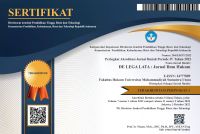Providing Gender Responsive Work Facilities To Support Women's Empowerment And Child Protection
Abstract
This research uses normative juridical methods. The research technique begins by sorting the laws and regulations governing Gender, and this is done to find out how available work facilities are in the Depok City Government. PPPA Ministerial Regulation No. 5 of 2015 concerning Providing Gender Responsive Work Facilities and Caring for Children in the Workplace, the aim is to fulfil the right to protection for women and children; Fulfillment of children's rights and guarantee children's growth and development; Environmental responsibility in the care and protection of children; Increase work productivity. The unavailability of lactation rooms, the availability of special waiting rooms for children in the workplace, and the implementation of curfews for female workers are the main focus, and this certainly supports SDS5, namely Gender Equality. Thus, workplaces must provide facilities and infrastructure that take into account the principles of gender equality and the best interests of children. The provision of gender-responsive facilities and infrastructure is intended to increase work productivity and pay attention to the best interests and growth and development processes of children. Apart from fulfilling and protecting the rights of women and children, this includes fulfilling the rights and protection of people with disabilities and the elderly. The result is that the Depok City Government has not yet demonstrated work facilities that have a gender perspective. Therefore, to accelerate this fulfilment, the Government should be able to utilize old, habitable buildings to fulfil work facilities with a gender perspective.
Keywords
Full Text:
PDFReferences
Agustanti, Rosalia Dika. 2020. “Penegakan Hukum Pelaku Perbuatan Cabul Dalam Putusan Bebas Terhadap Perempuan.” Yuridis 7(1):27–46. doi: http://dx.doi.org/10.35586/jyur.v7i1.1843.
Agustanti, Rosalia Dika, Rianda Dirkareshza, and Taupiqqurrahman Taupiqqurrahman. 2022. “Peningkatan Pemahaman Dan Kewaspadaan Terkait Fenomena Kekerasan Seksual Terhadap Perempuan.” JMM (Jurnal Masyarakat Mandiri) 6(4):2684–99.
Agustanti, Rosalia Dika, Satino, and Rildo Rafael Bonauli. 2021. “Indonesia Perlindungan Hukum Terhadap Pekerja Yang Mengalami Pelecehan Seksual Dalam Rangka Mewujudkan Bela Negara.” Jurnal Supremasi 11(1):42–56. doi: 10.35457/supremasi.v11i1.1092.
Aslichati, Lilik. 2011. “Organisasi Pemberdayaan Dan Kesejahteraan Keluarga Sebagai Sarana Pemberdayaan Perempuan.” Jurnal Organisasi Dan Manajemen 7(1):1–7.
Karso, A. Junaedi. 2021. Implementasi, Analisis, Perumusan Kebijakan Publik Kunci Utama Terselenggaranya Kesejahteraan Di Indonesia. Penebit Insania.
Khotimah, Khusnul. 2009. “Diskriminasi Gender Terhadap Perempuan Dalam Sektor Pekerjaan.” Yinyang: Jurnal Studi Islam Gender Dan Anak 4(1):158–80.
Nurhaeni, Ismi Dwi Astuti, Sri Kusumo Habsari, and Siany Indria Listyasari. 2011. “Efektivitas Implementasi Kebijakan Anggaran Responsif Gender.” JIANA (Jurnal Ilmu Administrasi Negara) 11(01):74–86.
Peter Mahmud Marzuki. 2022. Penelitian Hukum, Edisi. Revisi. Jakarta: Kencana.
Sihombing, Uli Parulian. 2016. “Perlindungan Hukum Terhadap Buruh Perempuan Di Tempat Kerja.” Jurnal Hukum Dan Bisnis (Selisik) 2(1):66–78.
Sukmana, Oman. 2016. “Konsep Dan Desain Negara Kesejahteraan (Welfare State).” Jurnal Sospol 2(1):103–22.
Suryono, Agus. 2014. “Kebijakan Publik Untuk Kesejahteraan Rakyat.” Transparansi: Jurnal Ilmiah Ilmu Administrasi 6(2):98–102.
Susiana, Sali. 2019. “Pelindungan Hak Pekerja Perempuan Dalam Perspektif Feminisme.” Aspirasi: Jurnal Masalah-Masalah Sosial 8(2):207–21.
Wibowo, Dwi Edi. 2012. “Peran Ganda Perempuan Dan Kesetaraan Gender.” Muwazah: Jurnal Kajian Gender 3(1):356–64.
Wiyani, Novan Ardy. 2017. “Perencanaan Program Kegiatan Responsif Gender.” Yinyang: Jurnal Studi Islam Gender Dan Anak 12(2):327–50.
DOI: https://doi.org/10.30596/dll.v9i1.18052
Refbacks
- There are currently no refbacks.
Address:
Faculty of Law, University of Muhammadiyah Sumatera Utara Jl. Kapten Mukhtar Basri No. 3 Medan, Kode Pos 20238
E-mail: delegalata@umsu.ac.id
Telp/HP/WA : 081262664567
DE LEGA LATA: Jurnal Ilmu Hukum is abstracting & indexing in the following databases:
De Lega Lata: Jurnal Ilmu Hukum is licensed under a Creative Commons Attribution-ShareAlike 4.0 International License.
Statcounter









